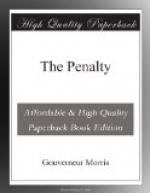“For old acquaintance’ sake.”
The beggar studied the young man’s face. Then he said: “Mr. Allen, I once had the honor to warn you against three things.”
“I remember.”
“Your face is innocent of wine and women. How about the gambling?”
“My friend,” said Wilmot, “you read me like a book. The gambling is all to the bad. I have just given you all the money I had in the world.”
“A few dollars are of no use to me,” said the beggar.
“Nor to me. Don’t worry.”
“I am not worrying. I’m thinking that you and I have something in common. And for that reason I am tempted to ask if a few thousand would be of any use to you?”
Wilmot smiled with engaging candor. “Fifteen thousand would.”
“You shall have them,” said the beggar shortly. He pointed to a glazed door across which was printed in gilt letters:
Blizzard—MFR. Hats
“That,” said the beggar, “is my name, and that is my place of business. Come in.”
Wilmot followed the beggar through the glass door, which at opening and closing caused a bell to clang. The front of the establishment was occupied by a dust-ridden salesroom, and an office with yellow-pine partitions. As he followed the beggar into this, Wilmot caught a glimpse in the distance of fifteen or twenty young girls who sat at a long table industriously plaiting straw hats. He lifted his own hat a little mechanically, and thought that he had never seen so many pretty girls at one time under one roof.
II
Wilmot buttoned his coat over fifteen one-thousand-dollar bills. Only supreme necessity could have persuaded him to take them, since, although he had not put his name to a paper of any kind, he felt a little as if he had sold himself to the devil. But Blizzard had shown him no deviltry; only kindness and a certain whimsicality of speech and a point of view that was engaging.
The transaction finished, Wilmot was for leaving, but being under obligation to the legless man was at pains not to be abrupt. He lingered then a little, and they talked.
“The first time we met,” said the beggar, “you were roller-skating with a pretty child. She was so pretty that I asked you her name. And I have never forgotten it.”
He did not add that he had watched that pretty child’s goings and comings for many years; that he had lain in wait to see her pass; that he had bribed servants in her father’s house to give him news of her: and that the day approached when, fearing neither man nor God, he proposed that she should disappear from the world that knew her, and go down into the infamous depths of that vengeance which had been the key-note of his life. Nor did he add that there were but two contingencies which he felt might thwart his plans: her marriage to Wilmot Allen, or his own untimely




